Updated on October 24, 2018
Your First College Roommate
One of the most challenging things college students face is living with their first roommate. You’re moving in with someone you’ve never met before and you’re expected to get along for a whole year. How things turn out between you and your roommate is probably going to be one of those stories you tell when you go home. So, whatever your story, here are some tips about first roommates to make the transition a little easier.
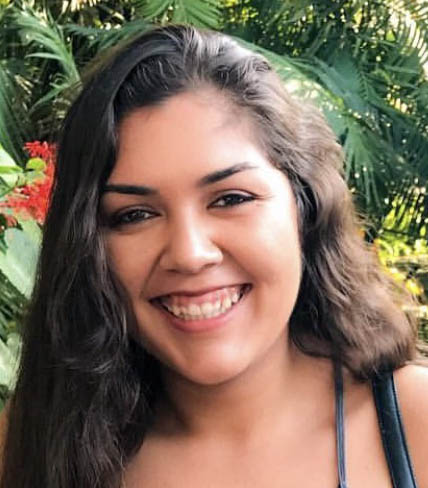
Joscelyn Q. Pardo
“You never what?!!!”
The first month living with my freshman year roommate, we said that a lot. My roommate and I grew up on opposite sides of California (me from North, she from the South) and the cultural differences were a shock to us both. She didn’t know what an It’s-It was and I’d never been to a Ralph’s. We went to an ice cream social together and she’d never heard Mac Dre, E-40, or any of the other Bay Area artists whose songs were playing. She also didn’t understand my Northern California slang, like “hecka” or “hella.”
But living with her was not hard at all because, although we are different, we got along well. Rooming with someone you’ve never met before and who comes from a different background than you is a great opportunity to expand your knowledge about a world you never knew or thought about. My SoCal roommate taught me a lot about skin care routines, for instance.
“I’m not moving out, you are!”
I’ve seen it so many times, when two roommates don’t get along. The conflict could be that one stinks up the room with old In-N-Out Burger bags, or one basically has their girlfriend living with them. My advice for this is to talk to your roommate as soon as issues arise and then come to a compromise. Waiting until you’re completely fed up will end with unwanted drama and with your saying things you never wanted to say.
But if the issue can’t be resolved, and the dispute is big enough for the housing office to permit one person to move out, the process of separating as roommates will be less awkward and smooth if you’re both civil.
“Will you be one of my bridesmaids?”
Although you’re living with a stranger in the beginning, roommates can become close and turn into lifelong friends. Long nights staying up talking about the events of the day and sharing new experiences can quickly build a special bond. Your roommate can easily become the person you want to take to Coachella or ask to be your future bridesmaid. Don’t push away the idea of getting too close to your roommate. Even if you already have good friends when starting college, your roommate can be another. I actually recommend that you don’t live with your best friend from high school, and instead stay open to new friendships and experiences.
Joscelyn Q. Pardo is a student worker in Marketing and Communications at Notre Dame de Namur University and a sophomore majoring in psychology, and an RA in a residence hall.
For more information on applying to Notre Dame de Namur University (NDNU), please visit the admissions page.
Posted on October 11, 2018
The Charism of the Sisters of Notre Dame de Namur
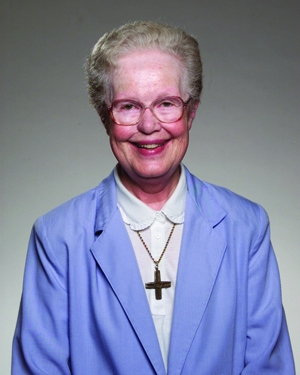
Sister Roseanne Murphy SNDdeN
Whenever someone speaks about the “charism” of a religious community, it refers to the original intention of the congregation and the spirit behind its foundation. In the case of the Sisters of Notre Dame de Namur, that original intention dates back to the stormy days of the early 19th century.
St. Julie Billiart began the Congregation of the Sisters of Notre Dame in 1804 in Amiens, France, at a tumultuous time. It was the period at the end of the French Revolution. Thousands of men had been killed during the many attempts of other governments to rescue the French monarchy. Once Napoleon took over the government in 1799, the Napoleonic Wars were fought at nearly every border of the country. Those conflicts also took an enormous toll.
Thousands of women died of tuberculosis or starvation during the French Revolution, leaving many thousands of their children orphans. For ten years, schools led by religious men or religious women were closed. Those closings resulted in thousands of orphans and other children being deprived of the free schools staffed by members of religious orders.
During the Reign of Terror, the revolutionary government in France targeted clergy and the church and attempted to eliminate all traces of Christianity. St. Julie longed to help bring back the Catholic faith to France after ten years of persecution of its members. She wanted to reach out to poor children, many of whom were homeless, to teach them that God loved them and that they had dignity.
St. Julie’s message is carried on the cross worn by members of her congregation: “How Good is the Good God.” That message is the hallmark of her congregation. That simple phrase identifies her “charism.” It also motivates her members to bring the message of God’s love for His people to all those served by her sisters. She admonished her sisters, saying, “You cannot just talk about the love of God to the children, you much show them if they are to believe you.” It is a noble ideal and an awesome challenge to all the members of the Sisters of Notre Dame de Namur.
Sister Roseanne Murphy is a professor emerita of Notre Dame de Namur University and a member of the Sisters of Notre Dame de Namur. The Sisters of Notre Dame de Namur founded NDNU.
For more information on applying to Notre Dame de Namur University (NDNU), please visit the admissions page.
Updated on September 19, 2018
Does a Transfer Student Get the Full College Experience?
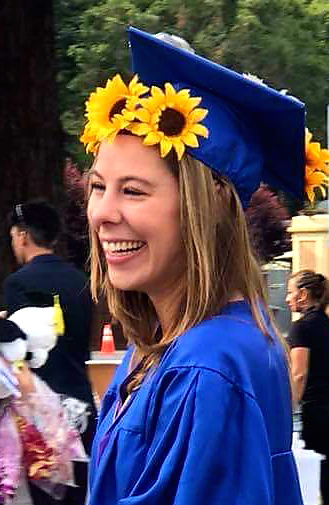
Andrea Rosewicz at NDNU Commencement, 2018
Throughout my years as a college student, I’ve heard the term “the full college experience.” Most often this simply means living on campus for four consecutive years at least 100 miles from your hometown. And the farther the better. As if there was one and only one magnificent college experience that a select few students ever get to have. I know plenty of people who chose to go to a four-year university right out of high school strictly because they wanted that traditional student “full college experience.”
Now, while I think living on campus in a new place can be a wonderful and exciting experience, it is not the only college experience. For a long time, I felt like I was missing out by attending College of San Mateo, my local community college, while working as a restaurant server in the evening. By the time I transferred to Notre Dame de Namur University (NDNU), I was really not the traditional student—I was a twenty-three-year-old college sophomore.
I couldn’t shake the thought that I should have graduated already and started a career, but I didn’t even know yet what I wanted to do with my life. All I knew was that I wanted to graduate soon. Correction: I needed to graduate soon.
When I transferred, my plan was to get in and get out as fast as possible. I had no idea then that NDNU would be the place where I would not only obtain my degree, but where I would find myself and achieve my own version of the “full college experience.” After a year at NDNU, I changed my mind about wanting to get in and out. I discovered passions that were buried deep inside me and was given the opportunity to allow them to bloom.
It wasn’t until I came to NDNU that I finally got the chance to find the interests close to my heart. What changed? I was encouraged to face my fears of failure in an atmosphere where even if I stumbled, there was something I could learn.
There’s no one correct path in college during what is arguably the best time of our lives. The “full college experience” should refer to so much more than simply living on campus and walking away with a piece of paper after four years. For me, NDNU is the place where I not only achieved my dream of graduating college, but gained the skills and found the confidence to pursue my next dreams.
Andrea Rosewicz graduated summa cum laude from Notre Dame de Namur University in 2018 with a bachelor’s degree.
For more information on applying to Notre Dame de Namur University (NDNU), please visit the admissions page.
Updated on September 10, 2018
Experiencing College: A Crash Course
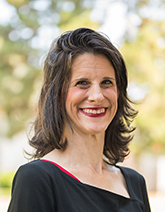
Professor Helen Marlo, Notre Dame de Namur University
Psychologist and educator John Dewey once said, “We do not learn from experience…we learn by reflecting upon experience.” I’ll begin by reflecting on an experience from my own education.
It’s 1982 and I’m an eighth grader at St. Joan of Arc Catholic School in St. Louis. It’s my good fortune to have as a teacher Mrs. Marilyn Hummel. She shares that she’s turning 40 and that no student has ever figured out her birthday. Turning 40 seems like a really big deal, and never having a party feels wrong! So, how can I pull this off? There’s no Google or internet. It dawns on me: if I get Mrs. Hummel to reveal her maiden name, I can search the St. Louis phone book and call her mother, who would surely remember her own daughter’s birthday, right? My plan works. And here I am, on the phone with Mrs. Hummel’s mother. With audible emotion, her mother responds, “You really love my daughter, don’t you?” Her mother’s empathy in naming my experience teaches me to understand my experience, which feels magical. She shares the coveted birth date and I throw the party. I’ll always remember the look on Mrs. Hummel’s face.
Upon reflection, I feel this story illuminates the transformative power of education. Our relationships and experiences matter. Joy, fun, love, and connection are profound teachers. The alchemy between an influential, loving, and talented educator, and a receptive student who feels loved and respected—that matters.
Fast forward to college. Experiences that were not necessarily “big” remain in my memory: returning home at Thanksgiving as a freshman—feeling independent and homesick; discovering with my roommate that gummy bears really do stick to dorm ceilings; asking my professor, as a sophomore, to take his Intro to Clinical Psychology class for seniors—facing my fear of rejection or failure paid off: he became my most important mentor; the fun, long conversations at The Chez coffee house; taking classes that were not required like The Creative Process. Was I wasting time and money? They turned out to be my most memorable courses! And lastly—OK…this one was a big moment: meeting my husband at a happy hour. We didn’t stop talking till 4:00 a.m.
I have heard countless stories of choices made during college:
- The classmate who did not get caught cheating—who got the best grade? He did. But many years later a board denied him from progressing professionally after discovering he had lied about his credentials.
- The friend whose mother ranted to the administration, demanding special treatment, including changing her daughter’s failing grade. This student came to see how always being treated as special was destructive. She wound up creating a profitable college tutoring service.
- The graduate who now enjoys his marriage, children, and career? His archenemy in the dorm responded with empathy by taking away his car keys when he was intoxicated.
Artist and poet Brian Andreas expressed: “Anyone can slay a dragon…but try waking up every morning & loving the world all over again. That’s what takes a real hero….”
When I began college, my dad shared: “If you want to get something done, give it to the busiest person you know.” He also admonished me in every phone call to “be good.” I returned home last December to be with my dad in his final days of life. Most people from my childhood were long gone. On returning to St. Joan of Arc parish for his funeral, any guesses who was at my side, providing me moral support and love?
Yes, Mrs. Hummel. Experiences and relationships in education are unique, and can forever change the fabric of our lives, if we are receptive.
Dare to experience. Dare to open yourself to the goodness. Dare to be vulnerable enough to develop life-changing relationships and experiences.
In the words of philosopher Henri-Frédéric Amiel: “Life is short and we have never too much time for gladdening the hearts of those who are traveling the dark journey with us. Oh, be swift to love, make haste to be kind.”
May your college journey be full: rich with presence and reflected-upon experiences; marked by meaningful relationships; filled with kindness and love…and yes, be sure to throw a party or two!
Professor Helen Marlo directs the Clinical Psychology program at Notre Dame de Namur University. This blog is adapted from the speech she gave at NDNU’s Convocation at the start of fall 2018 semester as part of her accepting the Keller Teaching Excellence Award.
For more information on applying to NDNU as an undergraduate, please visit the admissions page. For information on the Clinical Psychology program, please visit their webpage.
Updated on July 5, 2018
Wildlife on the Campus of Notre Dame de Namur University
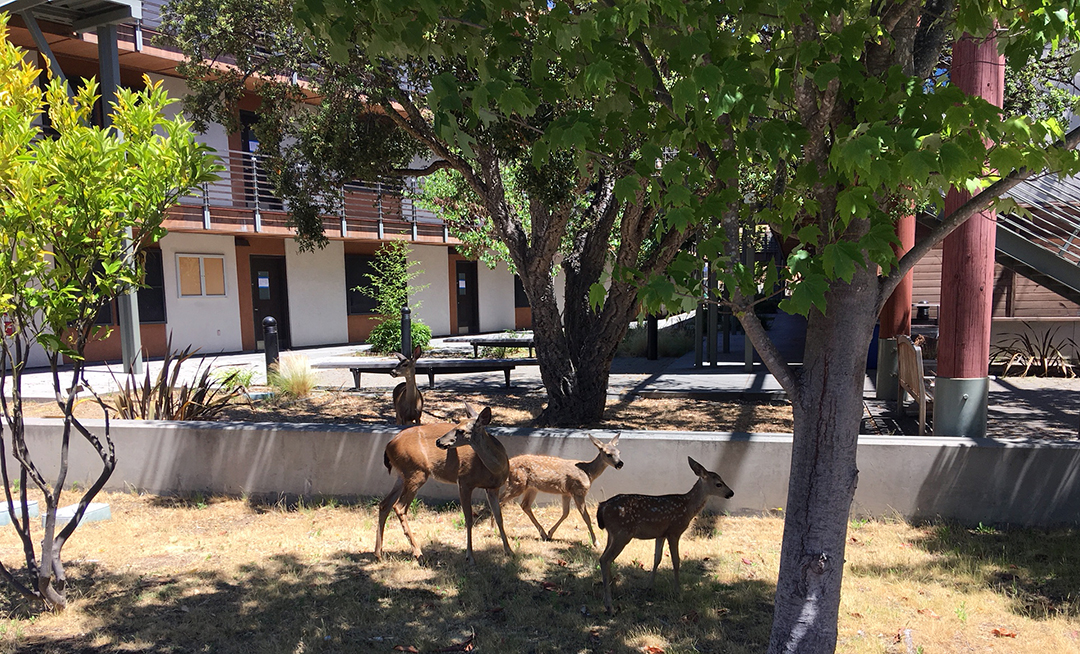
Deer eat the windfall from fruit trees on campus
The first sight you see when you arrive on the campus of Notre Dame de Namur University (NDNU) is often a family of deer grazing, complete with fawns. One spot the deer gravitate to is the area in front of New Hall student residence, where there are apricot, plum, and pear trees. When the fruit is on the branches, the deer come to eat the windfall off the ground. “They also like the cherries that grow by the student apartments,” remarked Chris Komahrens, NDNU’s director of facilities. Probably these tame deer find NDNU a congenial place because just up the hill from the classrooms and residential buildings there is a large natural area with plenty of secluded places.

Acorn woodpeckers on NDNU campus. Photo by Jennifer Rycenga, Sequoia Audubon Society
In addition to deer, there are multitudes of birds at NDNU. On a recent birding walk around campus guided by volunteers from the Sequoia Audubon Society, twenty-three different bird species were spotted in a short time. The sightings included a red-tailed hawk, Anna’s hummingbird, a black phoebe, and an acorn woodpecker.

Red-shouldered hawk on campus. Photo by Jennifer Rycenga, Sequoia Audubon Society
Some of the birds feed on the campus’s population of salamanders and alligator lizards (tiny reptiles that look like miniature alligators, only a few inches long).
Other species on campus include three different types of squirrels, among them a rather rare black squirrel. The nature area of campus also has a nocturnal population of coyotes and raccoons who avoid human contact. Spotting one is an unusual event, unlike sighting of the deer, who often play and scamper up and down the hills of NDNU.
For more information on applying to Notre Dame de Namur University (NDNU), please visit the admissions page.
Posted on June 12, 2018
Interview with Tom Stang, Brother of Dorothy Stang
Tom Stang is the brother of Dorothy Stang (1931–2005), Sister of Notre Dame de Namur, alum of Notre Dame de Namur University (NDNU), and activist for social change. She lived and worked for forty years in the Amazon rainforest in Brazil, starting a farmers union in Pará State, helping to set up twenty-three schools, and teaching sustainable farming techniques. Sister Dorothy was assassinated at the age of 73, shot by gunmen hired by local landowners.
Q: Could you tell us a little about your family and the world that Dorothy Stang grew up in?
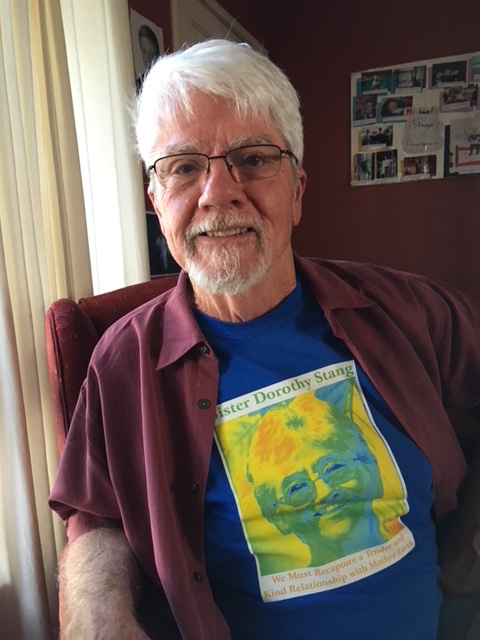
Tom Stang, Brother of Dorothy Stang
Tom Stang: We were a family of nine brothers and sisters, living in the countryside near Dayton, Ohio. It seemed like every two years our parents would have some more fruit on the vine. There were two sets of twins, girls who were four years older than I was, and me and my brother. Dorothy was one of the oldest children, and she and our sister Mary were the nursemaids, the caregivers for the younger ones.
Q: What kind of school did you attend?
Tom Stang: We went to a nearby Catholic school. The building had very few conveniences. There were outdoor privies, and two grades in each classroom, but lots of love from the Sisters of Notre Dame de Namur.
Q: How did the family react when Dorothy announced that she wanted to enter the convent at age 17?
Tom Stang: We were a religious family. There were aunties who were nuns, and uncles who were priests. Dorothy was nurtured and educated by Sisters of Notre Dame de Namur from an early age. When she decided to join the convent, it was a normal, natural thing.
Q: What were some of the influences that shaped her spiritually and politically?
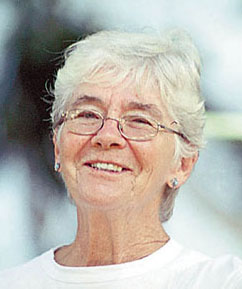
Sister Dorothy Stang (1931–2005)
Tom Stang: There were two major influences in Dorothy’s life: the first was the changes in the church that happened as a result of Vatican II [the Second Vatican Council, 1962–65, which called on the faithful to work for justice and bring the values of the Gospel into the world]. The second influence was Dorothy’s sabbatical where she studied creation spirituality with Matthew Fox—her interest in preserving the rainforest was related to that. For Dorothy, creation spirituality worked hand in hand with liberation theology.
Q: What do you think is the legacy of Dorothy’s life?
Tom Stang: I think it’s beautiful that her legacy is being kept alive through the Sister Dorothy Stang Center for Social Justice and Community Engagement at Notre Dame de Namur University. There’s also the Sister Dorothy Stang Scholarship at NDNU. [The scholarship is awarded to formerly incarcerated women living in a residential program and working toward a university degree; or to students who are refugees, undocumented, or former foster and other emancipated youth in financial need.]
Q: How would you describe Dorothy’s approach to life?
Tom Stang: Dorothy’s purpose in life was to serve others. Our whole family was brought up with that value: two of our sisters became nurses, one became a teacher, two entered the convent. My twin and I both became priests, though I eventually left the priesthood. The other two brothers served in the military during World War II.
Q: What were some of the main focuses of Dorothy’s work?
Tom Stang: She worked to preserve the land rights of poor farmers.
She was also very pro-woman. Dorothy had a reputation for serving the needs of women who were harassed or oppressed, which she did in Brazil. She worked for women’s equality. Sadly, prostitution was also common in the part of Brazil where she chose to live, and Dorothy worked with the prostitutes to educate them and to give them hope. She always tried to be of assistance to those who got off the track.
It hurt Dorothy dearly to see what was going on with deforestation in the Amazon rainforest. She also had a total identification with, and love of the people. Dorothy was a creature in love with God’s creation.
Help preserve Dorothy’s legacy by donating to the Sister Dorothy Stang Scholarship at Notre Dame de Namur University. To make a donation, visit this secure page and select the Sr. Dorothy Stang Scholarship Fund from the drop-down menu.
Updated on February 14, 2018
My Experience as a Resident Assistant: From Knockout to Mom Jeans

Joscelyn Q. Pardo
An easy way to figure out what a resident assistant (RA) does is to think about your mom. You know how you call your mom when you’ve got a problem you can’t solve yourself, like taking a stain out of your favorite shirt? So, residents call their RA and ask them how to drop a class after the deadline. RAs are also placed in residence halls in order to stop karaoke night running into quiet hours, among other possible sources of mayhem. At Notre Dame de Namur University, where I’m an resident assistant, RAs also build community by organizing “walkovers,” events where we attend a chocolate fest or a lacrosse game as a group; or the RAs host “do nut stress” study breaks, where students drop in for a treat during finals.
I applied for an RA position at the end of my first year in college. I was ready to put on my mom jeans and guide freshmen through their initial year at university. Instead, I was assigned to be in charge of a hall with upperclassmen (third- and fourth-year students). I looked at my list of residents and I was “shook”—everyone was older than me. Being an RA for students who already have gone through their first two or three years of college was intimidating, because they would have experience and wouldn’t need me in the way I expected.
My challenge the first few months of being an RA was earning the respect of all my residents, despite my age. How do you tell someone who’s old enough to be your uncle to turn down the music?
Then one day I was attending Argo Madness, the annual basketball season kickoff in the gym. The event featured a game of knockout with a duffel bag stuffed with gear as the prize. My residents dragged me onto the court, probably thinking I was going to embarrass myself and they would get a good laugh when I was the first eliminated. They didn’t know I had been on the basketball team in high school. As the competition went on and I stayed in the game, my residents started cheering me on from the sidelines. When I eliminated the last player, there was a big cheer and we all danced together to celebrate.
From that day forward, my residents saw that we had something in common—in my case, it was basketball, but any number of things could have built that tie. After creating a connection, I noticed my residents trusted me more, and the respect was building. They began to come to me with issues, which I helped them solve; and with their accomplishments, which I shared their pride in.
As an RA, it’s not easy to be an authority when dealing with your peers. During the day everyone is just a student, but at night my role shifts. It’s difficult when I’m documenting a student violating a policy and then the next day I have to act like nothing happened as we’re in class together discussing the reading.
It’s not my job as an RA to get people in trouble, or as my residents like to say, to be “the feds.” I try to explain to my residents and peers that whatever I do is part of the job that helps me stay enrolled in college. That breaks the tension a little. Besides, it’s more paperwork and less sleep for me to document incidents, so I just ask, please follow the rules.
There are some personal rewards to being an RA. At Notre Dame de Namur University, we have a tradition that parents or other loved ones write a letter to new students when they drop them off at the residence halls at the beginning of the semester. The RA keeps the letters until midterms, a stressful time for all students. I get to be the one who knocks on their door and surprises them with this note of encouragement from their closest loved ones. It’s not unusual for both the student and the RA to shed a tear when they read that letter.
Joscelyn Q. Pardo is a student worker in Marketing and Communications at Notre Dame de Namur University, a sophomore majoring in psychology, and an RA in a residence hall.
For more information on applying to Notre Dame de Namur University (NDNU), please visit the admissions page.
Posted on February 1, 2018
From Yearbook Editor to College Student
I was talked into joining yearbook my sophomore year of high school after realizing I was not Michael Jordan—my dream of a basketball career was heading out the window. I had never designed a single spreadsheet or photographed a senior portrait in my life, but I was excited to start something new. (Plus someone told me the whole staff gets to travel around the country, and who doesn’t love to travel?) Diving into yearbook taught and surprised me with life skills I still use in college.

Joscelyn Q. Pardo
Social Skills
I never considered myself a social butterfly. My friends were my teammates and my mom was the one who knew all the chisme, or gossip. Talking on the phone made me as nervous as giving a speech on live television.
Yearbook forced me to overcome all that awkwardness. I had to ask people to come in for face-to-face interviews, I invaded students’ privacy with a camera in their face, and I got over my fear of public speaking. Coming out of my shell took some time. After my adviser appointed me coeditor-in-chief, I learned more skills than just how to talk to people—I learned how to be a leader. I was able to manage a staff to the point of winning first place for the National Scholastic Press Association (NSPA) Best of Show award two years in a row. These skills have helped me land student leader positions my first year of college. I am now a resident assistant, an orientation team leader, and I know nearly everyone who lives on campus.
Technical Skills
You didn’t think winning first place was easy, did you? I learned the tips and tricks of Adobe Photoshop and InDesign after two years of sobbing in front of a computer screen because I forgot to save my latest design. Knowing the little things like how many picas are in an inch, or the rule of thirds has helped me get to where I am today.
During my time in high school I was able to use my new technical skills working at a local photography studio. In college I continue to use my skills for photographing events and adventures, designing Snapchat Geofilters, and being hired in the Marketing and Communications department here at Notre Dame de Namur University.
How to Work Hard
Being apart of the yerd (yearbook nerd) community, I discovered what it means to work hard. I spent countless days in the yearbook room working on designs and editing photos only to go home and study for a final the next day or go to work. Deadlines and events came whether I was ready or not. Finding the time, motivation, and most efficient way to do things was always a struggle.
In college, I’ve also had to deal with time management challenges. Assignment due dates are in the syllabus, but actually reading it is another story. Studying until 3:00 a.m. for an 8:00 a.m. exam is the worst idea, but it always happens. Balancing school, work, club involvement, a social life, and being a resident assistant is hard, but it’s nothing I can’t manage. Becoming a hard worker is something I developed in yearbook with time management and motivation, but it’s something I still continue to work on.
Joscelyn Q. Pardo is a student worker in Marketing and Communications at Notre Dame de Namur University and a sophomore majoring in psychology. In high school, she coedited the yearbook at James C. Enochs High School in Modesto, California.
For more information on applying to Notre Dame de Namur University (NDNU), please visit the admissions page.

 The ACT has a science exam. Before you dismiss this and move on to the next question, consider “science” from the ACT’s point of view. Not all students will have taken exactly the same science curriculum. Thus, the science section can only really test scientific reasoning and a few (very few) facts. You can succeed on ACT science if you can think like the test, and the only way to know if you can is to try it out. I’m living proof that you can succeed on ACT science without being a scientist. (You don’t want me to be your surgeon. Trust me on this —and my high school biology teacher.)
The ACT has a science exam. Before you dismiss this and move on to the next question, consider “science” from the ACT’s point of view. Not all students will have taken exactly the same science curriculum. Thus, the science section can only really test scientific reasoning and a few (very few) facts. You can succeed on ACT science if you can think like the test, and the only way to know if you can is to try it out. I’m living proof that you can succeed on ACT science without being a scientist. (You don’t want me to be your surgeon. Trust me on this —and my high school biology teacher.)